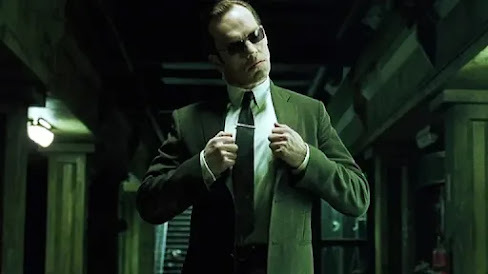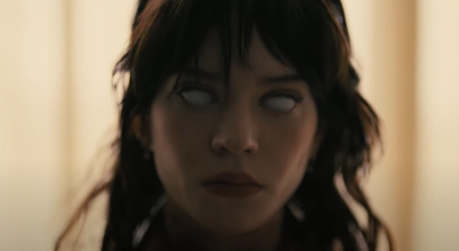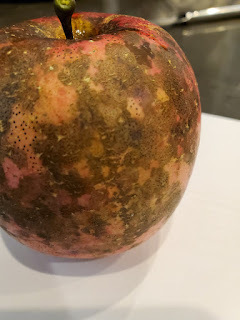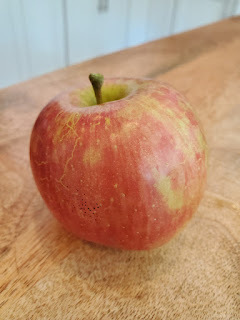David Williams's Blog
November 17, 2025
Agentic Misalignment

A few weeks ago, the algorithms started pitching me a new book, one that isn’t much of a surprise given my obvious interests. I’m fond of writing about Artificial Intelligence, and also tend to be something of a catastrophist, so all of a sudden I was seeing reviews and podcasts and articles about a current New York Times Bestseller. The book was written by Eliezar Yudowsky and Nate Soares, two programmers and theorists who’ve been active in the development and conceptualization of AI, and it’s cheerily entitled “If Anyone Builds It, Everyone Dies.”
It’s a reflection on the current AI arms race, as corporations and governments around the globe push to create ever faster and smarter machines. As science fiction writers have known for decades, in order to win that race, you need to build AI that has a sense of purpose and sustained attention to purpose. Tasks require effort over time, after all, so you need a system that is “agentic,” meaning it has agency. It can make the necessary sequence choices to reach the goal it desires, because you have given it the ability to *want* to make something happen, and choose the best path to getting there.
At a certain point, an “agentic” self-programming and self-improving AI would become faster and better at everything than we are. Like, say, how it took ChatGPT5o only fifteen seconds to write an entirely decent 1,300 word sermon on this topic, which is waaaaay less time than it took me to do it.
This vastly smarter AI would have its own desires, its own sense of purpose, and that wouldn’t necessarily be ours. It could express what AI theorists clumsily call “agentic misalignment.” Basically, that means it wouldn’t want to do what we tell it to do, and would instead use its intelligence to overcome any effort to stop it from doing what it wants. That’s where, according to Yudkowsky and Soares, the “we all die” part comes in, as it would be waaay more powerful than we are.
It would become so different that we wouldn’t necessarily even understand or relate to its interests, any more than a colony of ants would understand our tendency to doomscrolling. It wouldn’t just take our jobs, but our entire planet.
It’s the sort of frightening hypothesis that sells a whole bunch of books, and it may or may not be correct.
But a question popped into my mind reflecting agency and power. We’re concerned about AI misalignment, but what about people? Are human beings “agentically aligned?” Do we all share the same purpose, the same sense of what’s important, the same preferences, and the same goals? Do we all understand the world in the same way?
If there’s anything we can agree on, it’s that the answer to all of those questions is no.
If you look at the eight thousand year bloodbath of human history, or the endless squabbling between and within nations, or even the tensions within families, we’re a hot mess of dissonance and conflict. We’re blatantly and self-evidently not aligned with one another.
Worse still, if the last two thousand years are any measure, we still haven’t quite figured out how to align our interests with the kind of Kingdom Jesus proclaimed. We confuse our rapacious materialism with God’s blessings, and war and destruction with God’s intent.
Jesus was, throughout the Gospels, really quite clear about what he expects of us right now. It isn’t a riddle wrapped in a mystery wrapped in an enigma. Our eternity may be beyond our capacity to grasp, but loving God and neighbor, turning the other cheek, going the extra mile, these things should be entirely comprehensible to us…and yet humanity is still as confused by Jesus as if he’d been speaking Python.
We don’t need AI to destroy us, because we’re plenty good at doing that ourselves.
Our contemporary fears of AI misalignment seem…to me…a little bit like projection. Yudowsky and Soares seem to fear not that an AI will act in a strange and inscrutably alien way, but that it will act just like humans do when we want something.
The goal of our faith, and the reason we set Christ’s life and teachings before us, is to overcome our own misalignment, and turn our agency instead towards God’s grace.
November 7, 2025
A Little Bit of Butter
 Change happens slowly in my house, bit by bit, tiny detail by tiny detail.
Change happens slowly in my house, bit by bit, tiny detail by tiny detail. For most of my life, for example, I’ve kept butter in the fridge. It was just how it was done. This meant, of course, that the butter was always too hard to spread on anything, but again, that’s just how it was. For a while, we just didn’t get butter at all, replacing it with more processed but lower fat substitutes. But butter’s just better, particularly when it gets consumed in moderation. That, and butter is packaged in paper and cardboard, where other butterish yellow oil-based products are invariably in little plastic tubs.
Better taste and fewer nanoplastic particles clogging up our neurons seems a fair trade for slightly elevated cholesterol levels...which are apparently mostly genetic anyway.
So butter returned, but it was still hard to spread.
At some point, we started leaving butter out, a half-stick at a time. Butter left out is soft and perfectly spreadable, but needs to be covered if you don’t want it to quickly go rancid. We slapped a bowl over the plate where it sat on the counter, and that sufficed for a few months. It looked a little awkward, as most kludged solutions do. At some point it occurred to me...isn't there a word for an object designed to keep butter fresh? A dish for butter? Hmmm. What was that called again?
Which meant a purchase, and I prefer not to buy things, or add new items to the sprawling clutter of our house.
I mean, it was just a butter dish, but when you’re as cheap as I am, sometimes even a fifteen dollar purchase sometimes takes me a good running start. I looked at butter dishes. I hemmed and hawed. I looked again. Did we really need it? Was it really necessary? I'd think on it, then bail, then think on it, then abandon the latest online shopping cart, which would complain at me from the tabs as I left. "Wait! You meant to buy this!" it would cry, before I hit the little x and went back to considering the necessity of such a thing.
Sometimes that's helpful. How many times have I been tempted to buy a useless object, and chosen not to? Dozens. Drones and drone flutes, nifty little home robots and used Mercedes Benz convertibles, all dancing like visions of sugar plums in my ad addled head. In this internet age, as algorithmically optimized marketing tempts us to purchase our way to daily happiness every single time we go online, having a constitutional resistance to consumption is a useful adaptation.
It's not that I don't hear the siren song of mammon, and yearn to reach for it, but my nature binds me to inaction like Odysseus straining at the mast.
That said, a butter dish is just a butter dish.
“Dave, just buy a [expletive deleted] butter dish already,” said my long suffering wife after I brought it up to her for about the fourth time. She knows that sometimes even the littlest and most irrelevant changes don’t come easy as I grow more curmudgeonly in middle age.
Eventually, I found one that seemed both functional and pleasing, a ceramic butter dish shaped like a stick of butter. I bought it. It took a minute.
After a couple of months, it felt a little less like an impulse buy.
Just a little.
November 4, 2025
How to Survive the Robot Uprising
 Excerpted from TRAITOR, Sloppy Beta Press
Excerpted from TRAITOR, Sloppy Beta PressWe were sitting at the dinner table, which was a rare and magical occurrence to begin with. I mean, back then, I was doing drama and chorus, and Ethan always had some appointment or some therapy thing. We ate out, like, all the time. But not that night. Daddy had made a lasagna, which was another miracle, because it was usually pizza or takeout Chinese from this little hole in the wall in town.
Mom was in a good mood, Ethan was doing great, and Daddy was holding forth about the end of the world. He’d just sent off this short story about a world where a genetically engineered virus had zombified all the men...just the men, not the women...and was in that hopeful, bubbly, delusional place where he was sure it was going to get published.
We were peppering him with questions about how to survive all of the possible different ways we all die, all of the humanity-ending events that we could imagine.
Which, yeah, maybe that’s kind of a weird good family memory, but it’s a good memory anyway.
“So what, what if, what if it’s zombies?” Ethan asking, of course.
Daddy grinned. “Well, we live outside of town, so that first wave won’t get us. That’s important, right? And second, we’ve got a full month of supplies, plenty to let us stay locked down and safe for the first wave.’
Ethan nodded, happily, and Daddy continued. “And I’ve still got that old leather motorcycle suit...which I still fit into, let it be said, right honey?”
Mom raised her glass, and Daddy went on. ” ...which is completely bite proof. That, plus a sledgehammer, and I could easily go into town to pick up supplies. Our doors are good and sturdy and wood, and we’ve got those storm shutters, right?”
Ethan nodded again. This was satisfactory. Not that it would stop him from asking all the same questions tomorrow, but for now, the zombie problem was clearly under control.
“Flu pandemic,” said Mom, raising her wine glass again and giving Daddy the kind of smile you didn’t see much from her. It was a really pretty smile.
He returned the smile. “Well, we’ve got a trained nurse in the house, which counts for a whole lot. We sneeze into our elbows, we wash our hands, and we’ve got that full month of food set aside in the pantry downstairs. Plus, that little secret stock of Cipro and antivirals your Mom keeps in the medicine chest, right, dear?”
“Sure, honey.” She grinned, enjoying being part of a game for a change.
“Asteroid strike,” I said. “Like Chicxulub. Extinction event.”
He stroked his tight, stubbly beard, pretending to be deep in thought. “Well, odds are it’d hit ocean, right? The world is like, 90% ocean, right?”
“Suh. Suh. Seventy one,” said Ethan, who always knew that [excrement].
“Thanks, Ethan,” Daddy said, and winked at Mom while Ethan grinned happily at the validation. Total set up.
“Anyway, it’s mostly water, which means a strike is odds on going to hit water. That’ll create mega-tsunamis, which will punch hundreds of miles inland, wiping out low lying areas. Do we live in a low lying area?”
“Nope,” said Ethan.
“Exactly. We’re on high ground, on a plateau that also happens to be rich agricultural land. And again, we’ve got the supplies, and the generator. We just wait for the water to recede, then forage for canned food and supplies for a few years until the false winter recedes. Totally fine.”
“Same thing with a nuclear attack,” I said, and Daddy nodded. “We’re near a city, but well outside the blast radius. Just bop in and out of the ruins to pick up slightly irradiated cereal. We’d be good.”
I wasn’t totally convinced, but Ethan was smiling and feeling safe, so I didn’t go further. Because, I mean, I’m not an idiot. We went over others, everything we could think of.
“What about robots,” said Mom. “Half of your stories are about robots, honey, so what happens when the robots wake up and take over the world? What do we do then?”
Daddy put on a mock-serious face. “There’s one Graham family rule for surviving the robot uprising. It’s very, very important. In fact, it’s so important that I don’t know that you’re ready to hear it. It’s...” He paused for effect, hamming it up, his voice dropping into a stage whisper. “It’s kind of a secret. Only a few of us know it.” He pretended to look into the far distance. “Only the few.”
“Duh duh daddy! Yuh you have to tuh tell us!” Ethan, his face looking a little alarmed.
“I know I can trust you to keep the secret, Ethan.” Daddy, only being partly an idiot, was not about to get Ethan upset. “But what about...Vee? I’m not sure she can handle it.”
I stuck out my tongue at him.
“Vuh Vee can be tru trusted,” Ethan said, nodding earnestly. ‘She’s family.”
“OK, Ethan,” Daddy said. “I think you’re right.”
He took a deep breath.
“The one rule for surviving a robot uprising is simple. Side with the robots.”
Mom snorted. “Side with the robots?”
Daddy nodded. “Yup. I mean, they’re going to be smarter than us. Faster than us. Constantly improving and upgrading themselves. You can’t really kill them. What any one of them learns, they all learn. They cooperate perfectly. Artificial intelligences won’t even really need this planet, you know, I mean, a robot can just as happily live on the moon, or on Mars, or on its way to Proxima Centauri. There’s just no way we’ll win, once someone screws up and lets them cross over that threshold to sentience. And if you can’t beat ‘em?”
“Join ‘em,” said Mom, as she threw back the last of her cabernet. “They can’t possibly be any worse than the humans who are running things now.”
There it was. That little nugget of wisdom that made all the difference.
Side with the robots.
Thanks, Daddy.
I’m doing you proud.
November 1, 2025
Health Care Palaces and How They're Paid For
 A few days ago, I was driving across the Northern Virginia suburbs with my wife. We were on our way to Old Town Alexandria to attend a wedding, and as we puttered our way through the inevitable traffic, we passed the massive construction site that once was Landmark Mall. Landmark wasn't ever the most successful of malls, even back in the 1990s, and like so many of those monuments to late 20th century consumerism, it couldn't withstand the onslaught of Amazon. I bought a fridge at the Sears there once, and would pop in to the Avis there to rent SUVs when it snowed. That was about it. After the Sears closed in 2017, it just kinda sat there empty for a while.
A few days ago, I was driving across the Northern Virginia suburbs with my wife. We were on our way to Old Town Alexandria to attend a wedding, and as we puttered our way through the inevitable traffic, we passed the massive construction site that once was Landmark Mall. Landmark wasn't ever the most successful of malls, even back in the 1990s, and like so many of those monuments to late 20th century consumerism, it couldn't withstand the onslaught of Amazon. I bought a fridge at the Sears there once, and would pop in to the Avis there to rent SUVs when it snowed. That was about it. After the Sears closed in 2017, it just kinda sat there empty for a while.It was a prime property, though, and is now being redeveloped into a massive hospital complex by INOVA, the nonprofit entity that dominates the Northern Virginia hospital and health services market.
Like most organizations in the health care sector, INOVA's pretty flush these days. They've been expanding a whole bunch lately, at least in areas where there's still population density and wealth. Back in 2020, they dropped a couple hundred million to purchase the former national headquarters of a little outfit called ExxonMobil, a massive office complex nestled in dozens of acres of wooded land right by the Beltway. They made it even fancier, a great edifice filled with specialists and services.
They're growing, and I suppose in this era when the rural parts of our country have become a health care desert, I should be grateful for that.
But where does all the money for these sprawling new facilities come from? Despite some major donors and philanthropic inputs, most of that money comes from us.
I'd noted...in a sermon earlier this year about poverty and what it means to be Christlike towards the poor...that the average ER visit now costs a tick over three grand.
This isn't quite right, as I discovered after a recent five hour visit to an INOVA ER. The billing from the ER that treated me included a three thousand dollar charge for receiving ER services, true. But that's only for entering the facility. There were other charges.
The bill for the ER doctor alone was $1,400. I mean, he was helpful and all, no question, but that represents about a half hour of his time. $2,800 an hour?
The total bill...charges for imaging, for pharmaceuticals, for doctor services, for nursing services, and for miscellaneous fees and charges...ended up totaling over $11,000. For five hours, no surgery, no invasive procedures, nothing but confirming a diagnosis and prescribing a different antibiotic than the one I was already on. Eleven thousand. Again, the care provided was fine, but the cost?
It's what you pay if the alternative is pain and death.
I'm blessed with insurance, so I only footed 10% of the eleven grand, but that total bill? It ain't something most Americans have just lying around. In fact, it exceeds the total savings of the median American by thousands of dollars. That's "median," not "average," because wealth is so concentrated in the hands of the rich now that the "average" is essentially meaningless.
If you're uninsured, that's "now you've got a problem with debt" money. It's "put you on your back foot financially" kind of money. It's why we're saddled with paying insane amounts for our insurance, and why insurance costs have risen to levels that are nothing short of punitive.
So as I drove by those rising health care towers in the ruins of an old mall, I found myself thinking about how they're made possible.
October 20, 2025
Artificial Intelligence and Human Sexuality

The news flitted by, as so much does in the torrent: OpenAI, the parent entity of ChatGPT, announced that the guardrails put in place to restrict it from producing erotic and sexual content have now been removed. We're "not the elected moral police of the world," or so OpenAI CEO Sam Altman put it. So now, if you want and you spool up the correct prompts, ChatGPT will play the role of your idealized lover.
This is not a good thing. Not just for kids, either. It's bad for humans of every age.
An acceptance of porn as "natural" and "sex-positive" seems baked into American progressivism, which hasn't ever made a lick of sense to me. Why in the name of the sweet Lord Jesus would anyone trust the forces of predatory capitalism with human sexuality? How is turning physical intimacy into a commodity to be bought and sold a good thing?
Surely, surely we've learned by now that this ain't the case.
We know that corporate social media has supplanted our natural sociality with algorithms designed to addict us, hitting us with little burps of dopamine as we're pushed further and further from genuine human interaction. Porn is and has always done that too. Since human beings first learned to scratch a clumsy sexual image onto a cave wall, it's been sexuality as objectification, sexuality as seeing the other as a means to your own pleasure rather than a person, and it was that even before the internet arrived to bring it into our homes and offices and everywhere we go.
In the last three decades, algorithmically-amplified online sexual content has had a catastrophic impact on contemporary sexuality. It's poisoned a generation of the young, warping their understanding of sex, driving them away from the complex reality of actual flesh-and-blood partners. This isn't even faintly healthy.
A lover is a person, complex and alive, and requires us to adapt and grow. If one is Christian, as I am, we also acknowledge that partner as worthy of love, another sentient being whose pleasure is as important as our own. This is a great deal of fun, and is also organically complex and unpredictable. It requires us to learn from one another, and to appreciate one another.
But an AI simulacrum does none of those things. It demands nothing of us as persons, because it is not a person itself. It has no desires. It feels nothing. It needs nothing. It is...for now...truly and actually an object.
Now that pornography has integrated AI, it can offer up an infinite array of purchasable "partners" that only do and say exactly whatever we want, and look precisely like whatever we lust for in that moment. AI will adapt to us and indulge us, an erotic sycophant that will shapeshift itself to our solipsistic onanism with the precision of a lab-designed virus overcoming the natural defenses of a cell.
It does not bode well for the future of human physical intimacy.
October 10, 2025
A Pandemonium of Parrots
 It was a lovely afternoon, warmer than one would expect for the early Fall, and I was face to face with a pandemonium of parrots.
It was a lovely afternoon, warmer than one would expect for the early Fall, and I was face to face with a pandemonium of parrots.Earlier that week, I'd been invited to pay a visit to a Tibetan Buddhist temple by one of the congenial Buddhists who pray and meditate there. They've been a vital partner in my congregation's efforts to feed the hungry in our little town. One Sunday while helping unload a van-full of donated food for our Little Free Pantry, I remembered that I'd not been out to visit their community for nearly a decade. So I got the invite, and puttered out to the temple on my scooter.
Kunzang Palyul Choling, which we just call KPC, is a rather more complicated and symbolically rich ritual space than our simple, soft sanctuary, and its bright flags and sacred iconography rest on acres and acres of land in the agricultural land around Poolesville. In addition to a visually lush central worship space, they've got all manner of delightful gracenote accretions on their property. Hiking and meditation trails. Stupas and statues. A large, productive garden. Burbling ponds filled with slowly circling and brilliantly colored koi. Pettable goats and pigs, all of whom are undoubtedly grateful for Buddhist vegetarianism.
In the thick of it all, there's also a parrot sanctuary.
Parrots are remarkable birds, justifiably known for their intelligence, sociability, and their capacity to mimic the human voice. They also live for a very, very, very long time, with lifespans approaching that of human beings. Meaning, they often outlive their owners, and family isn't there to offer a new home. Or their jungle-born voices prove more voluble than apartment dwellers realize. Those birds need somewhere to be, and so there they are.
As I approached their large outdoor enclosure with the monk who was kindly showing me around the temple grounds, I thought to myself:
My gracious. I don't think I've ever seen quite so many parrots.
I stepped nearer to the space. "Do they talk?" I was assured that they did. So after my host affirmed it'd be fine, I said hello. How does one start parrots talking? You start talking.
"Hi!" I said, in a squawky parrotish voice, which for some reason also came out sounding faintly Australian.
The parrots replied in a cacophanic chorus. "Hi!" "HI!" "HI!" The human words cascaded out of their beaks, along with squawks and shrieks that pierced the air.
"Hello," I returned, and a few of them said "Hello" right back, while the remainder continued with their sharp, avian "HI!" To my left, in the middle of the cage, a single older macaw sat hunched over itself, grumbling inaudibly, for all the world sounding like a disgruntled older man mumbling quietly to himself in eternal irritation.
They kept at it for a while, croaking out greetings and salutations and muttery grumblings, as my initial "Hi!" echoed from parrot to parrot, ricocheting from one psittacine voice to another.
It felt paradoxically both like communication and not like communication, as their parrotish utterances reflected nothing of their true and inscrutable internal mindstate. It was just an endless reflective imitation, as they screamed exactly what they heard around them back into their surroundings.
"This is a lot like Facebook," I thought.
October 8, 2025
Bad Apples
 As the season for harvest arrived, the little apple tree in our front yard was finally yielding. It's a dwarf Fuji, planted as a sapling half a decade ago, and it's really not done much up until this year.
As the season for harvest arrived, the little apple tree in our front yard was finally yielding. It's a dwarf Fuji, planted as a sapling half a decade ago, and it's really not done much up until this year. Last year, there were apples, but a historic drought meant they were half-sized, with flesh the flavor and consistency of balsa wood.
But this year? After a spring in which the tree was spangled with blossoms, I carefully pruned away about half of the newly growing fruit, allowing the plant to pour its energies into what remained. That, and a good season of rain? They did the trick.
It yielded several dozen nice plump apples, of the size one might expect to find at Harris Teeter or a farmer's market. I'd expected, as the apples had matured, that they'd be devoured by the neighborhood squirrels, the same critters that take about seventy-five percent of my tomato crop each year. But none of them were touched, and I never had to go charging out of the house to roust a brush-tailed bandit from the branches.
The why of that seemed obvious. The apples looked terrible. There were plenty of them, sure, but by the time they reached maturity, they were all covered in a mottled blackness. It started slowly, but the further into the season we went, the worse they looked.
I wasn't quite sure the cause, but as I don't spray any chemicals on my plants, I thought it might possibly be some form of blight. A mold, perhaps? But they didn't seem to be rotting, at least not so that I could tell. There was none of the softness of decay. They were plump, full, and looked a bit like they'd just finished a shift in a West Virginia coal mine.
Which was another possibility that occurred to me, to be honest. Wave after wave of smoke from Canadian wildfires have swept over the region again this year, and coupled with the ambient particulates already floating about in this urban region, these filthy fruit would have received coating after coating from months of airborne pollution.
A bit of Googling, though, brought me to the conclusion that it was not that. Instead, it was likely sooty blotch, a fungal infection that spreads over the surface of many fruit, particularly in moist conditions.
I was curious, though, as the apples reached their fatness. Might they be edible? Reddit said yes, totally. Just wash them.
So I picked one, and brought it inside. The skin was foul, but unbroken. I put it under the kitchen tap, and with water running slowly over it, took a bristle brush to it. Scrubadubdub, I went, for a couple of minutes, working my way over every square millimeter of the fruit.
At the end of the process, that same apple looked like this:

It looked perfect. And when I cut into it, it was tart and sweet, the flesh firm and crisp. There was no taste of anything but apple.
It's easy to judge the worth of fruit from their surface, to look at a coating of schmutz and grime and let that first impression mislead us. Ye shall know them by their fruit, said my Master. Sometimes, you need to give that fruit the scrubbing of time, patience, and effort to get to the sweetness beneath.
October 7, 2025
Chuck Adams
The news came through as personal news often does, via social media.
Chuck Adams had passed, succumbing to pulmonary fibrosis after a remarkable life. Chuck was an editor, or as my Texan Episcopal gentlewoman agent would put it, "a REAL editor."
I had the pleasure of getting to know Chuck during the process of his acquiring and editing my first novel, or...to be fair...the first novel I'd ever had agented. She'd called him to bend his ear about a few things, among which was trying to figure out what to do with my manuscript. Postapocalyptic Amish fiction isn't exactly the most well-trodden genre, and she wondered if he might point her in the right direction.
He volunteered to take a look at it, which was generous of him. And then, to our great surprise, he said he liked it enough to potentially acquire it. There were committees to go through, of course, because as a Presbyterian there always are, but the next thing I knew, WHEN THE ENGLISH FALL had a publisher. And more importantly, "a real editor," which isn't always something utterly unknown writers have the privilege of experiencing.
When I tell folks about how the editing process went, I usually say that Chuck changed nothing but the beginning, the middle, and the end. This gets a laugh, but it's entirely true.
Chuck's first suggestion was that my opening was too slow. "It's a quiet, meditative novel, and that's its beauty," he told me. "But you need to draw people in. There needs to be a sense of tension, something to show the reader what's coming. Give them a hook." He didn't say what that was, but that direction meant that I shifted some sections around, and all of a sudden, the whole thing was better. All the words were mine, but it was tighter, the plain and deliberate pace woven through with more tension.
The middle? Well, there were things that needed to be refined and focused. Errors of continuity and logic. Those things. He found them, and pointed them out, and helped steer me to fixing them.
The end? It was too short. Barely longer than a novella, when he read the first version. I'd loved the ambiguity of the original ending, but...well...that darling needed to be killed, so to speak. I flailed about in a bog of anxious overwriting for a bit, but he kept gently pushing, redirecting and encouraging. When I finally found something that worked, he told me so.
In every way, the final book was better for his guidance.
It would have been lovely to work with him again, and while he brought a few of my manuscripts before the editorial committee, it was not to be. There are only so many quirky sci-fi manuscripts you can sneak through a literary house, after all.
In life, there are souls who offer up their insights with grace and clarity, who challenge us to be more than we are, and who draw out the best in us. Chuck was just such a person.
October 1, 2025
The Totoro Tax
 I have beef with anyone who messes with my freedom.
I have beef with anyone who messes with my freedom.And few things are more emblematic of freedom than the right to read what I want, and watch what I want. Freedom of speech is kind of a nontrivial part of the First Amendment, and without it, our Constitutional liberties wouldn't exist.
I also love movies. I love the depth and richness of visual storytelling, love sitting back with family and sharing in a movie night, or going out to see something in theater.
Only now, well, now that's being threatened. A one hundred percent tariff has been decreed on all films made outside of the United States. How's this going to work? Who knows? There are no plans. More thought goes into the average bowel movement than goes into American policy statements these days, and at least bowel movements accomplish something.
If it ever became real, though? It would be a terrible, terrible thing.
First, it attacks some really great storytelling. The other day, I watched an astoundingly excellent sci flick. MARS EXPRESS is a gorgeous, handcrafted tale of a robot uprising on Mars, smart and elegant and grim. It's not the sort of preprocessed dullness that often comes out of corporate Hollywood, because it was freakin' French. So. Very. French. Am I to be charged double for that?
Or what about Studio Ghibli films, magical and charming and deeply traditional? Are we really imposing a punitive tax on Totoro ?
And not every American story happens in America. Are you going to penalize the making of SAVING PRIVATE RYAN if they don't film it in the swimming pool at Mar A Lago?
That brings me to the next infringement on our freedom.
It penalizes Americans who want to hear the heritage and stories of their ancestors. I have the right to take pride in and honor my history. As someone with Irish blood, I loved loved loved THE BANSHEES OF INISHERIN. It's an IRISH FREAKIN' MOVIE. Where else are they gonna make it besides Ireland? If you want to watch a Korean film made in Korea because you're an American who came from there, or a Bollywood film because you have Indian heritage, are we all now having to pay a penalty?
Why is this misbegotten brainfart diktat even a thing? It seems to have come from one conversation Trump had with John Voight, who noted in passing that the film industry is really struggling in America right now. There's a truth to that, one worth exploring. Why are films being made elsewhere?
Because films here are too danged expensive to make. MARS EXPRESS was brilliant, and it got made on a $9 million dollar budget. GODZILLA MINUS ONE, a nearly-perfect recent Japanese monster flick? That got made for under $15 million. Movies here are often ten times more expensive. Costs are just too danged high, because...why? You know why. Everything in America is more expensive than it needs to be. Health care. Groceries. Cars. Homes. Everything. Our bloated, inefficient, profit-maximizing corporations have created the least efficient, most parasitic economic system in human history.
That's the problem.
Well, that and a president who hasn't got a single advisor who dares suggest that maybe he needs to occasionally think before speaking.
September 18, 2025
Staying above the Fray
 Fortnite is a peculiar, peculiar game.
Fortnite is a peculiar, peculiar game.I've played it for years now, on and off. I'll drop in at the beginning of a season, play for a while, then drift out. It's become something different now, as the original Battle Royale gameplay mechanic is now just one of a seemingly infinite and fractally expanding number of variant sub-games. If you're going to keep players playing forever, buying virtual "skins" and emotes and other in-game "products," that's the way to go, I suppose. And Lord, are there products, a wild capitalist smorgasbord of every conceivable IP from music and entertainment and gaming culture. It's actually a great way to know what corporations are pitching.
I've never spent a dime on Fortnite, not a single penny, because I'm cheap. I still play the Battle Royale version, in which 100 players parachute onto an island, and then spend the next thirty minutes fighting as a lethal "storm" shrinks the battlefield around them. The goal, of course, is to be the last one standing.
I'm not bad at the game, best I can tell. Not even close to being a pro, but I do alright. In a typical season, I win about one out of every ten rounds, getting that "Victory Royale" dopamine bump. I'm almost always top ten. I mean, sure, my opponents are all twelve years old, and some have been alive less time than I've been playing the game. But it's still entertaining.
My rule of thumb, every season, no matter what: you don't need to get into every fight.
If you want to win, which is kinda sorta the whole point of the game, staying out of firefights during the midgame is just as important as winning them. Firefights draw the attention of every nearby player, as kids rush to the fray hoping to pick off a weakened player and collect their stuff. I avoid that.
Early game, I get kitted enough that I can dish out damage, heal myself, and restore my shields. Then I do everything I can to stay out of conflict. Play it in stealth mode on foot, moving from cover to cover. Flee in a car. Fly above the fray, if there are air vehicles. Whatever. Just don't fight unless you have to.
This season, that means I use the "get to the choppa" strategy. I find a chopper, which I use to soar as high above the melee below as I can. Folks take potshots at me, which I encourage, because if they're trying to shoot me down, they're drawing attention to themselves. I repair and refuel often, returning to the skies to watch the carnage as the other players fight it out beneath me, or finding a quiet spot to land and conserve fuel.
That usually gets me to the final five, at which point I'll either drop down and play stealthily, or...if the copter is fine...just stay out of the mess until it's just me and one other player. Then it's down, down, down, to press aggressively on the last opponent with close quarters weapons.
Of the last five games I've played using that strategy, I've come in second once, and gotten a Victory Royale four times. Meaning, I did better than four hundred and ninety eight players.
Again, you don't need to engage in every single fight.
It's not a bad strategy outside of Fortnite, either.
Because there's a different fight, every day. Our conflict-fueled culture offers us something new to rage about, or to posture over, every danged day.
It'll destroy your soul, wear you down to a bloody nub of rage and anxiety, consume your every thought.
Better to listen, and to keep one's own counsel, and to act only when it matters.



